| Spotlight
Golden Jubilee of Bangladesh Agricultural University
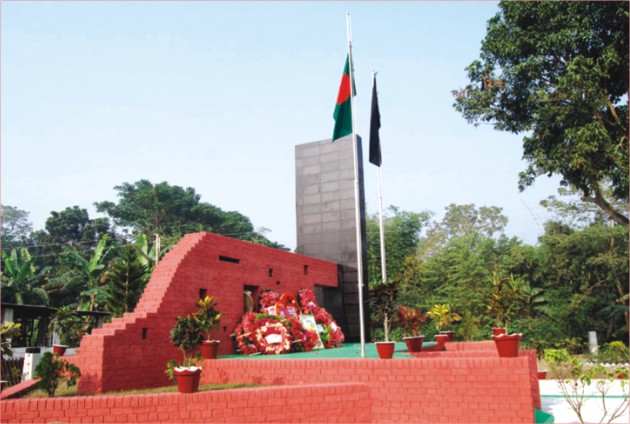
Bangladesh Agricultural University (BAU) observed its golden jubilee through undertaking various programmes on August 18. The university authorities were all set to welcome the distinguished guests and well-wishers with open arms.
BAU campus, a place of great natural beauty, is located on the Western bank of Old Brahmaputra River, some five kilometers away from the district town and 120 kilometers away from Dhaka. The campus includes a botanical garden, two monuments on War of Liberation including Bijoy'71, monument on Language Movement and a beautiful auditorium. It is the hub of academic and research work in Mymensingh.
Erected on 485 hectares of land in the year 1961, the BAU campus boasts picturesque faculty buildings, student dormitories, and administrative building. The campus also houses two national level institutions--Bangladesh Institute of Nuclear Agriculture (BINA) and Bangladesh Fisheries Research Institute (BFRI).
Marking the occasion, BAU authorities chalked out a daylong programme that included hoisting of both national and university flags, a rally, tree plantation, seminar and inauguration of a fish museum at BAU.
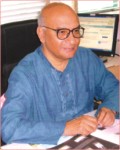 Agriculture Minister Begum Matia Chowdhury was the chief guest at the inaugural session. Later, the minister joined a seminar titled 'The Achievements of BAU and Future Perspective' which was organised to celebrate the occasion. Earlier, Matia Chowdhury inaugurated the daylong programme releasing some pigeons. Agriculture Minister Begum Matia Chowdhury was the chief guest at the inaugural session. Later, the minister joined a seminar titled 'The Achievements of BAU and Future Perspective' which was organised to celebrate the occasion. Earlier, Matia Chowdhury inaugurated the daylong programme releasing some pigeons.
The seminar was also addressed among others by Fisheries and Livestock Minister Abdul Latif Biswas, MP, State Minister for Health and Family Welfare Dr. Captain (Retd) Mujibur Rahman Fakir, MP and State Minister for Cultural Affairs advocate Promod Mankin, MP as special guests. BAU Vice-Chancellor Prof. Dr. M A Sattar Mandal chaired the function. BAU proctor Professor Md. Abu Hadi Noor Ali Khan and registrar Md. Nazibur Rahman addressed the inaugural session.
Students Affairs adviser and president of celebration committee Prof. Md. Mustafizur Rahman delivered the welcome speech. He narrated the successful 50 years of the university from where hundreds of scientists came out and have been serving the nation with their technical knowledge.
Matia Chowdhury told the seminar that scientists and researchers should develop more salinity tolerant varieties of rice and fruits to cultivate in the country's southern region to boost rice production to meet up the ever growing demand. To achieve food autarky, we should go for more rice and fruit production in every part of the country, said the minister while addressing the seminar at Shilpacharya Zainul Abedin auditorium of the university.
Terming BAU as pioneer in respect of agricultural research and education in the country as well as in Asia, the minister also said that more research in agri-sector is needed to develop more varieties to support the country's agriculture and economy in coming days.
The present government has already set up many agricultural institutions in the country to promote this sector to fulfill the dream of the father of the nation, Matia said adding 'Bangabandhu started green revolution in the country after independence to make the country self-sufficient in food'.
BAU sources said that there are six faculties and 44 departments under the faculties. The faculties are - Faculty of Agriculture, Faculty of Animal Husbandry, Faculty of Veterinary Science, Faculty of Agricultural Economics and Rural Sociology, Faculty of Agricultural Engineering and Technology and Faculty of Fisheries. A total of 43 subjects are taught under the six faculties.
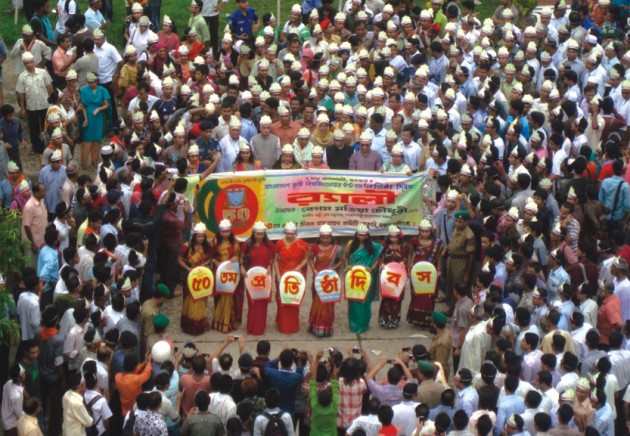
At the Undergraduate level, university offers a 4-year Post-HSC course ended with eight semesters under course credit system leading to the B.Sc honours degrees in respective faculties. At the Postgraduate level, a total of 40 teaching departments are engaged in conducting the courses with relevant research programmes in three consecutive semesters for MS degree in specific disciplines.
BAU sources said that there are 4401 students in honours and masters level under 44 departments in six faculties of the university presently. There are also 341 PhD students at present. The departments are run by some 511 teachers including 241 professors, 76 associate professors, 158 assistant professors and 36 lecturers, BAU sources said.
A total of 22976 students did their honours while 12624 completed their master's degree from BAU since its starting. The figure included 101 foreign students.
Some 262 students did their PhD from BAU so far.
According to BAU history, on recommendation of the Education Commission, set up by the then Government of Pakistan in 1958, it was decided to establish two technological universities - a university of engineering and technology and an agricultural university - in each wing (East and West) of Pakistan. Subsequently a separate recommendation was followed by National Education Commission and the Food and Agricultural Commission in 1959 and the then government promulgated its ordinance on August 18, 1961.
With the appointment of Professor Dr. M. O. Ghani, as its first vice-chancellor, the university formally came into being on September 2, 1961 at its present location. Earlier it was the campus of the then East Pakistan College of Veterinary Science and Animal Husbandry.
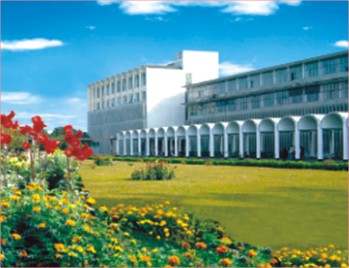 What the students say about BAU What the students say about BAU
The present and old students of the university have very high opinion about their institution. They think this university is the most potential educational institution of the country. As the country's economy depends on agriculture and this university producing graduates in this sector who have been playing a major role in developing high-yielding varieties of various crops and fruits to meet up the ever growing food demand. Though the population of the country has doubled since Independence but the food crisis could be met by the relentless research of the agri-scientists.
Md. Shahin Alam, a student of Animal Husbandry Faculty told this correspondent that they are proud of being associated with the golden jubilee celebration of the university. It will be a milestone in our life and we will bear it for ever, said Anwara Khatun of the same faculty.
Uday Roy and Sadequl Islam Sizan of Veterinary Science Faculty said that BAU must contain its prestigious position in future to serve the nation producing scientists and researchers. Soma and Badrul Hasan Riad of Agriculture Faculty opined that more contemporary academic courses should be run to take the university to World standard. Abdus Salam Sagar of Fisheries Faculty said that as Agriculture is the mother of all economy, so there is no alternative of such technical university to tackle the food crisis, now a burning question throughout the world.
Some old alumni of BAU - Md. Faruq Hossain, ABM Aminul Haque, Jahidul Islam Tuhin, Ratan Kumar Bowmik, Nusrat Ara Nazlee, Pranab Kumar, Md. Arifur Rahman, Abu Bakar Siddiki and Ranjan Das also expressed their deep love for their past institution where they were educated to lead a respectable life.
Expressing their profound gratitude, they said that the days left behind at BAU campus can only be imagined in our daily hard and drab days but these days will never be returned. BAU has passed its 50 years with name and fame in and outside the country and we want to see better performances of BAU in the coming days, said Md. Faruq Hossain, now working for UNDP.
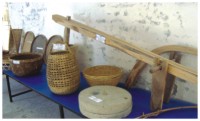 An hour with the BAU VC An hour with the BAU VC
Prof. Dr. M.A Sattar Mandal, an eminent academician and writer took over the charge as the vice-chancellor of BAU in November 2008. Earlier he was the dean of Agricultural Economics and Rural Sociology Faculty.
About the present academic atmosphere of the university, Dr. Mandal said that now the university runs with zero session jam. The university was not closed down even for a single day in last two years, said Dr. Mandal.
The university activities are digitalised and all the 11 student dormitories on the campus have internet coverage, said the vice-chancellor.
Most of the academic circulars and meetings are now served through internet and BAU admission process had also gone through internet from last year. We have increased allocation in budget for research work and it is increasing every year to pave the way for smooth running of research work, the ultimate goal of this institution.
The university authorities have created a 'quick response fund' to address emergency development issues such as fish epidemic, urea foliar spray and animal diseases etc. Modernisation of BAU Botanical garden adorned with huge varieties of plants and trees to attract the visitors every day from different corners of the country and outside is also another achievement in recent years, he added. Our initiatives to enlarge BAU germ plasma center and to gear up the milk production at BAU dairy farm will surely add more income, the BAU boss hoped.
Terming BAU as 'Center of excellence', Dr. Sattar Mandal said that agricultural farms should be developed with new scientific crops to conserve new crops and gear up research. The university must also be linked with national policy level through research, policy advocacy and consultancies, said the vice-chancellor.
To make the university more potential not only in Bangladesh but also in Asia, more fresh academic programmes like Bio-technology, Climate and Environmental Science, Marine Fisheries and Agri-business Studies etc should be introduced soon to cope with the present competitive world, suggested the vice-chancellor.

Son of late Alhaj M.A Gafur Mandal and Sahera Khatun of village Gopinathpur in Nagarkanda under Faridpur district, Prof. Sattar Mandal passed his SSC from local Krishnapur High School in 1965 and admitted himself in Agricultural Economics and Rural Sociology Faculty at East Pakistan Agricultural University (now BAU) and did his B.Sc (Ag. Econ) and M.Sc (Ag. Econ) in 1970 and 1971 respectively.
Later he did his PhD from London University in 1979. Dr. Sattar Mandal also did his post doctoral degree from Oxford University in 1987.
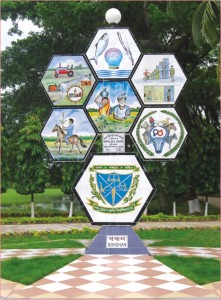 Dr. Sattar Mandal joined BAU as a teaching fellow under the department of Agricultural Economics in 1973 and he became the lecturer of the same department the following year. With hard labour and devotion to teaching, Dr. Mandal marched forward with credit and became successful in his teaching career. He became the head of the department in 1987 while serving as the dean of the faculty in 1997. Dr. Sattar Mandal joined BAU as a teaching fellow under the department of Agricultural Economics in 1973 and he became the lecturer of the same department the following year. With hard labour and devotion to teaching, Dr. Mandal marched forward with credit and became successful in his teaching career. He became the head of the department in 1987 while serving as the dean of the faculty in 1997.
Dr. Sattar Mandal showed his talent in extra-curricular activities during his university life. He was the literary competition champion from 1968 to 1970 at BAU. He was the two times runners-up of inter-university debate competition held at Bangladesh University of Engineering and Technology (BUET) and BAU in 1972 and 1973 respectively.
Dr. Sattar Mandal also showed his talent in debating by participating in All Pakistan Inter-university Debate Competition held in Lahore in 1970. “I from BAU and Mahfuz Anam, the editor of the Daily Star from Dhaka University, joined the competition from East Pakistan and Mahfuz Anam was the champion of the competition and I also got a prize. In recognition of my performance in literary activities, I won Nazmul Memorial Gold medal from BAU in 1973.” Dr. Sattar Mandal, a good reciter also worked as BAU correspondent of the Daily Ittefaq. He wrote many articles and short stories in magazines and newspapers.
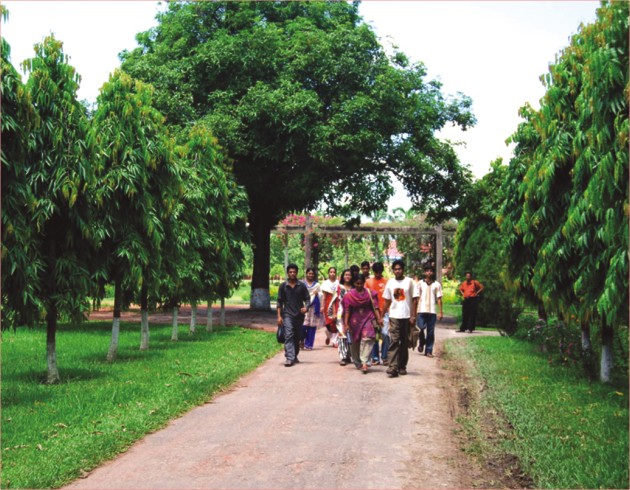
|

